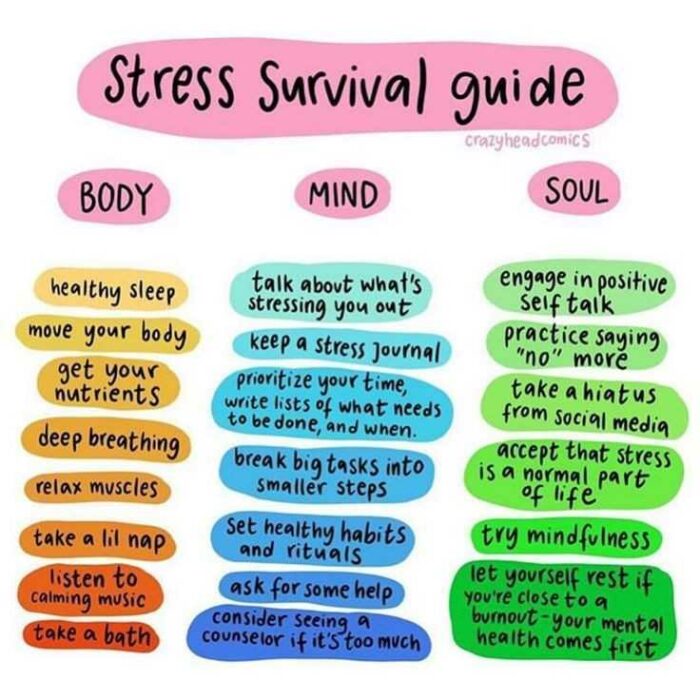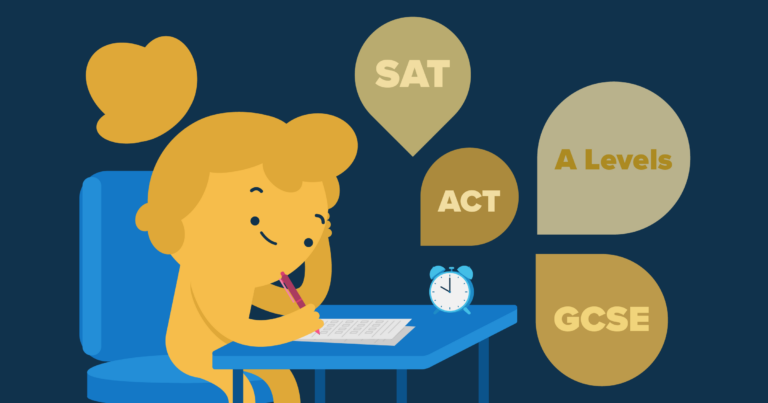You’ve probably heard of the term ‘burnout’ before. Maybe you’ve even experienced it yourself. Back in high school, I landed up in hospital due to burnout and anxiety because of my studies. I then went to see a psychologist to help me cope better and work through underlying issues. Burnout is never a nice thing, but it’s a sign that you need to slow down and rest! If you’ve never experienced burnout before (or if you feel like you’re coming dangerously close to it), this post will give you all the info you need on burnout, including what signs and symptoms you need to look out for.
First Things First: What Is the Meaning of Burnout?
Without a doubt, the past few years with the COVID-19 pandemic have been tough on all of us. And for you, the student, this has meant adjusting to lessons online, isolating, reducing social interactions, dealing with sickness and loss, and missing out on the general student experience. All of this takes a massive toll on your mental health. As you start making a return to campus life, we want you to be prepared mentally and emotionally for this new transition and avoid burnout as best you can.
The APA Dictionary of Psychology defines burnout as ‘a physical, emotional, or mental exhaustion accompanied by decreased motivation, lowered performance, and negative attitude towards oneself and others.’ Burnout happens when you have constant pressure, stress, and frustration with very little time to relax, recharge, and do things that are good for your overall well-being.
Often your parents and teachers may unknowingly contribute to you experiencing burnout. I was once told that in an ideal world, we would use our days like this: eight hours for work/school, eight hours to do things we enjoy (sports, cooking, reading, relaxing), and eight hours for sleep. But sadly, we know that’s not possible when you’re a student. That’s why it’s crucial you know the signs and symptoms of burnout so that you can take action before your symptoms and mental health worsen.
An Important Step: Recognising the Signs and Symptoms of Student Burnout
If you’re feeling anxious, stressed, and exhausted right now, know that you are not alone. The APA’s recent Stress in America study found that 81% of teenagers say that school closure because of the pandemic has had a significant negative impact on their lives. 52% of these high schoolers stated that they were less motivated to complete schoolwork, and 45% felt they were having difficulties concentrating. For college students, the study revealed that almost 90% of Gen Z students say their education causes overwhelming stress.
It’s important to know that all of us are at risk of burnout, whether at school, on the sports field, or even at work. And sure, some students may be more at risk of experiencing burnout if they already live with mental illness or have learning difficulties (which may require them to spend even more time at school). But burnout can happen to anyone at any time. Here are the signs and symptoms of burnout that you need to look out for (not only in yourself but in your peers too):
- Feeling unmotivated and uninspired (e.g. no desire to attend lessons, do assignments, participate in sports or social activities).
- Feeling uninterested in activities that you usually enjoy.
- Experiencing increased irritability and frustration and maybe snapping or lashing out at others.
- Struggling to concentrate and meet deadlines (which results in being unproductive).
- Feeling constantly exhausted (even if you are getting enough sleep).
- Feeling unable to cope (surviving instead of thriving).
- Forming bad habits because you are so stressed (e.g. under- or overeating, not sticking to routines, going to bed too late, using alcohol as an escape, etc.).
- Experiencing physical symptoms, such as headaches, muscle pain, stomach problems.
- Feeling more and more anxious and developing a negative outlook towards school.
- Feeling detached and like you don’t have a purpose.
Wait, Do I Have Depression? Depression versus Burnout
The symptoms of burnout and depression are similar, so how do you know if you might have depression? Firstly, it’s important to monitor your symptoms closely and, when possible, get an accurate diagnosis from a health professional (rule of thumb: if ever in doubt about your mental or physical health, see a doctor ASAP – try to avoid self-diagnosis!). Burnout can lead to depression, so it’s essential to stop burnout in its tracks as soon as you can.
In general, depression also comes with extremely low self-esteem, feelings of despair and hopelessness, a negative outlook on life, and suicidal thoughts. Depression also requires longer-term therapy and/or medication, whereas burnout can often be resolved by making the right adjustments and forming healthy coping mechanisms. Also, in terms of student burnout, the stress is related explicitly to school (i.e. it is specific to a specific situation). In contrast, depression is often not situation-specific and can appear irrespective of an environment’s circumstances.
Cause of Burnout in Students
Recognising the causes of burnout can help you put preventative measures in place to stop it from happening to you or your peers. For students, these are the typical causes of burnout:
- A heavy workload (we know this is unavoidable at school/college, but there are ways to help you manage this workload).
- Being in an unsupportive environment or getting no reward for your efforts (this can make you feel like the work you’re doing or the effort you’re putting into an activity is useless).
- Having a lack of balance between your school life and home life where you devote too much of your time to school/sports and forget to take care of yourself.
- Trying to deal with upsetting events (like the COVID-19 pandemic) or distressing content (maybe you’re studying psychology and have to work with patients with trauma).
- Experiencing discrimination or unfair treatment.
- People having unreasonable expectations of you (this can easily happen with parents and teachers placing pressure on you to perform academically or athletically).
So, now that you know what causes burnout, what actions can you take to stop it from happening to you or others around you?

Recognise the signs and symptoms of burnout so that you can get help and take action as soon as possible. Jessica Warrick, Pinterest and Instagram
Preventing Burnout: What Can You Do to Help Yourself and Others?
I was watching my favourite series the other day, and one of the characters who was fixing a leaking pipe said, ‘People only look for leaks when the water’s coming out, but it’s the pressure that’ll get you.’
As we mentioned before, it’s always best to see a trusted healthcare professional for a diagnosis, help, and advice. When I experienced high stress and anxiety, I spoke to a teacher I trusted, who then put me in touch with a psychologist. Seeing a school counsellor or psychologist can be highly beneficial. They can guide you in developing healthy habits and coping mechanisms and help you create a recovery plan if you’re already experiencing burnout.
But besides seeing a health professional or therapist, here are some things you can do to prevent burnout:
- Use a mood tracker to track how you’re feeling each day. A great app to put on your phone is MindDoc. This app helps you track your mood and symptoms and offers psychological exercises and courses to improve your overall well-being. There’s also an app called HeadHelp that lets you track your mood, make friends, and discuss what you’re going through. It also offers helpful articles and exercises, and there is a section specifically dedicated to academic studies.
- Plan your days so that you have some time set aside for yourself. Use this time to switch off from schoolwork and do something you enjoy. You can also use this time for self-care activities like mindfulness, meditation, and gratitude journaling.
- Use weekends and holidays for what they are – times to relax and see family/friends. Of course, you will inevitably end up having to study/do homework on weekends, but make sure that you set aside at least one whole weekend (or at least one full day) for recharging your batteries and doing things that help, not harm, your mental health.
- Build healthy habits (see a professional for advice or use a habit tracker app on your phone). This can include going for a walk, exercising, getting eight hours of sleep, eating right.
- Speak to your friends, family, or teachers you trust when you’re feeling overwhelmed. Talking to someone is absolutely critical and is always the first step to getting better. If you don’t want to speak to someone you know, you can do a Google search for mental health support services.
- If you’re struggling to keep up with school work, speak to your teachers. A plan can always be made to help you out. (For example, I got extra time to complete my exams in high school.)
- Work on your time management and planning skills (there are many apps to help you set goals and priorities for each day).
- Remember that rest is also productive – you need it to recharge. Never see rest and time out for yourself as being ‘lazy’ or underachieving. Think of your phone – if you don’t charge it and put it down for a while, it has no battery, and you can’t do anything with it. The same applies to you!
- Treat the cause, not the symptoms. Establish why you’re heading for burnout and make the necessary changes. And most importantly, never blame yourself for how you are feeling.
- Try to replace words like ‘should’, ‘would’, and ‘could’ with the phrase ‘I get to’. For example, ‘I get to go to the gym today and move my body’ or ‘I get to study with my great group of friends for this test.’ Practice self-compassion, remove talk that puts you under pressure, and reframe things you have to do positively.
- Set those boundaries and surround yourself with the right kinds of people who will support you and help you build good habits. Setting boundaries may mean saying no to doing someone else’s work for them in a group project.
- Be kind to yourself. When you’re not achieving your goals, it’s very easy for negative self-talk to creep in. You need to talk to yourself the way you would talk to someone you love (or if you have a pet, think of how you talk to them! Whenever my cat does something, no matter how small, I always say to her, ‘Such a good girl! You’re so smart!’ – so can you imagine if you spoke to yourself like this?).
- Follow helpful accounts on Instagram or TikTok for advice, guidance, encouragement, and community. Some accounts you can follow are @actionhappiness, @theblurtfoundation, @stresslescampaign, @timetochangecampaign, @theofficialsadghostclub, @myselflovesupply, and @breakingtaboo. You can also listen to podcasts.
- Lastly, if you are struggling and need to speak with someone urgently, the National Suicide Prevention Lifeline in the UK is 0800 689 5652. Add this number to your phone contacts.
Never, ever be ashamed to open up about how you’re feeling. The world is getting better at talking about mental health, so don’t be afraid to reach out to someone. Chances are, they’re going through or have experienced something similar.
Be sure to check out our other articles, too! We’ve got one on using Headspace, the popular meditation app, and how to overcome anxiety, failure, and expectations.












